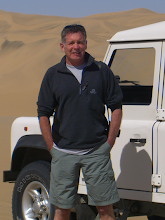As I write this I am sitting as a special guest in the Bureau (~Board) meeting of the Commission for the Geological map of the World (CGMW) in Paris. The very first public utterance about OneGeology was actually made at a CGMW General Meeting here in Paris almost exactly 4 years ago – I was kindly given an opportunity by Jean-Paul Cadet, the then President of CGMW, to make an unplanned 10 minute presentation about a half-baked idea. A couple of weeks earlier, in an email to a small group of international colleagues, I had floated some thoughts about a global digital geological map spatial database project, something that had come to me as I was jogging around damp January Nottinghamshire country lanes. The idea didn’t have the name OneGeology in the CGMW presentation; it had the rapidly produced and instantly forgettable working title of global GEO-Map. The name OneGeology was a spark of brilliance by a colleague in BGS – John Stevenson. I don’t think any of us, even now, fully appreciate just how much the success of the project is down to the wonderful simplicity, memorability and unifying nature of that name.
Anyway, I digress, back to the CGMW Bureau meeting and the general subject of this blog. We have just had a good discussion about the un-joined-up state of national geology maps served by OneGeology. Not intra-national inconsistency (I won’t go there, I don’t want to intrude on ubiquitous private grief), but inter-national inconsistency. It was noted that OneGeology is doing well in making national geological map data accessible, but the map data being served doesn’t fit together; the science is not in harmony – the terms, the concepts and the geometry - who is going to sort it out? Good question and one that OneGeology encountered right at its outset. We came to the conclusion that our first goal was to make the data accessible – in whatever state it was in. Anything is better than a white space right? What is happening is that a situation, appreciated some time ago by a relatively small number of experts around the world and one that the core team of OneGeology was aware of too (indeed it was a subtle goal), is now being made starkly evident to all – geology is not joined up and substantial collective effort by us geologists is needed to rectify that. But, adopting the philosophy of all the best management consultants, this is not a problem, it is an opportunity. It is the strongest endorsement of the goals and work of CGMW, an organisation which has, for over a century, picked up the gauntlet to try and take a holistic approach to the geology of our planet.
Closer to home (well at least mine), an element of the continuity challenge is nearer to getting solved. For several months now Work Package 3 of the OneGeology-Europe (1G-E) project has been tackling the problem of defining a specification for rock type (lithology) for this EC project. Intense discussions within the 26 nations of Europe and between 1G-E and the global community represented by IUGS-CGI will result in a vocabulary and data model for the project – one which is a subset of the global scheme. All 1G-E participating nations will begin to “map” their national data to this scheme. Of course some will not be entirely happy – after all any such scheme represents a compromise. But it is a very significant step on the road to recognising and addressing a problem that we geologists need to sort out if our science wants to be a regional or global player.
Finally, here’s a synopsis of the Tweets that have gone out since the last blog….. There are now 115 countries participating in OneGeology - Cuba (Institute of Geology and Palaeontology) is the latest country to join; the Ontario Geological Survey has also joined the team – we welcome them both; the AGU journal EOS published a one-page article on 1G on 2 February; We had a very encouraging meeting with the BBC and 1G could be featured in major documentary - Naked Earth - in March 2011; The February edition of the 1G Newsletter is out; we also had a great meeting with coordinator of European and global GeoParks to discuss linkages with 1G and we will document the linkages we feel are worth developing; and finally thanks to friends in JRC there will be a geoscience session at the INSPIRE conference in Krakow in June. You can follow news on 1G as it happens and the Twitter URL is http://twitter.com/onegeology
Saturday, 13 February 2010
Subscribe to:
Comments (Atom)


